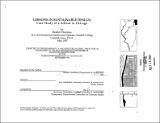Lessons in sustainable design : case study of a school in Chicago
Author(s)
Hootman, Heather
DownloadFull printable version (34.49Mb)
Other Contributors
Massachusetts Institute of Technology. Dept. of Architecture.
Advisor
Roy Strickland.
Terms of use
Metadata
Show full item recordAbstract
This thesis develops an approach to environmentally sustainable design through the hypothetical redesign of the South Loop School in Chicago. Sustainable architecture seeks to reinforce ecological relationships to the greatest extent possible, be they among humans or between humans and other species. Increasingly, pressure mounts in our society to design with such ecological sensitivity. This is especially true in regard to buildings for children- a population vulnerable to environmental problems and significantly influenced by surroundings. The design of an elementary school facility in particular also has the potential to both act sustainably and, on some level, teach sustainability. If, in addition to implementing materials that are nontoxic in ways that conserve energy, the built environment can simultaneously heighten an appreciation of the forces of nature, then it might truly be called sustainable. Thus, this thesis pushes sustainable design beyond its marginalized role of technical implementation by linking it to architectural theory about the relationship between architecture and nature. Sustainable design in this thesis attempts to translate environmentally conscious strategies into active and expressed design elements while fostering an appreciation of natural elements through architectural form.
Description
Thesis (M. Arch.)--Massachusetts Institute of Technology, Dept. of Architecture, September 1994. "June 1, 1994." Includes bibliographical references (p. 175-179).
Date issued
1994Department
Massachusetts Institute of Technology. Department of ArchitecturePublisher
Massachusetts Institute of Technology
Keywords
Architecture.